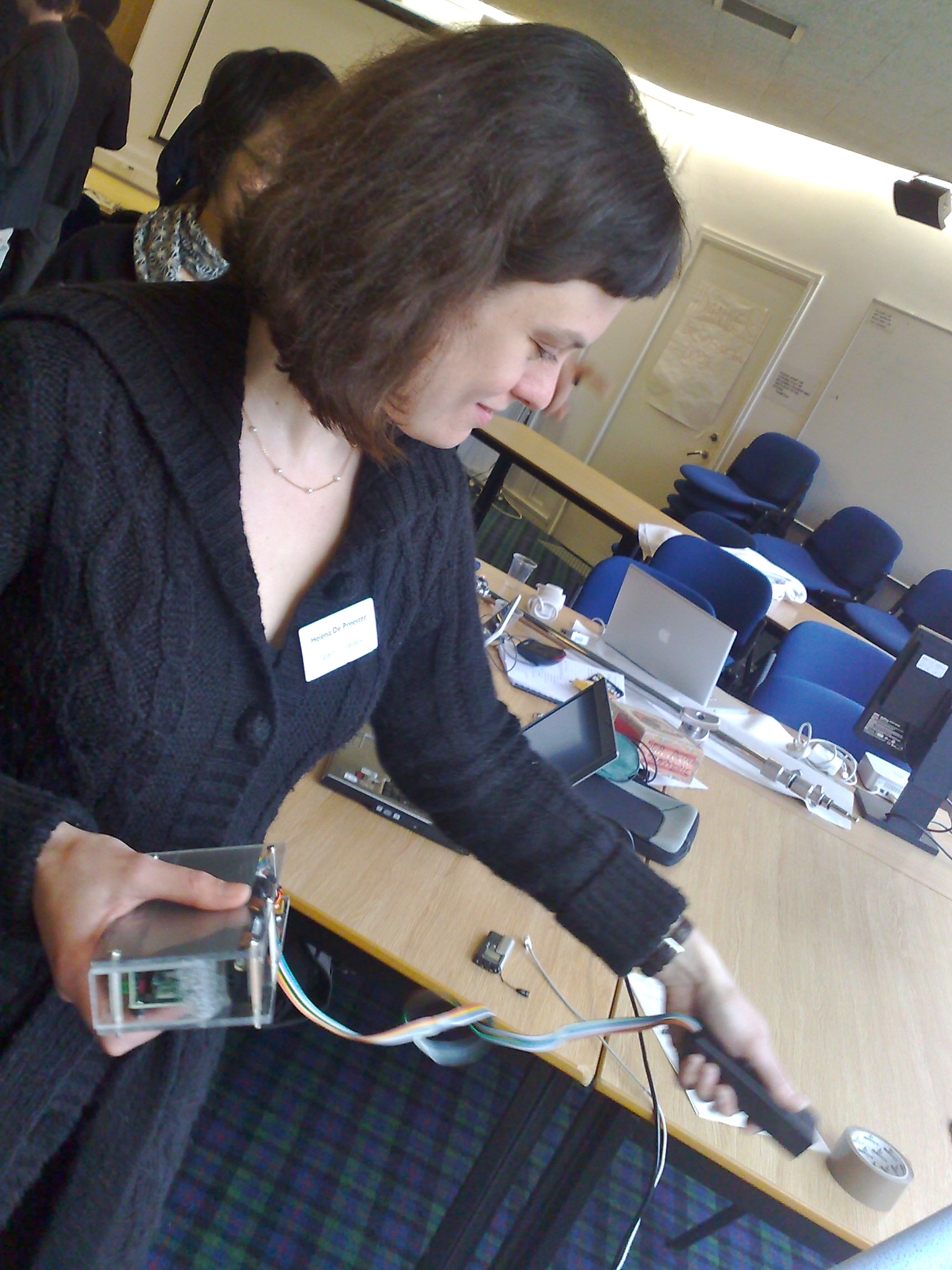
Sensory Augmentation, Synthetic Phenomenology and Interactive Empiricism
11/12/13 • -1 min

Helena de Preester using the Enactive Torch
On Thursday the 26th and Friday the 27th of March, 2009, the e-sense project hosted the Key Issues in Sensory Augmentation Workshop at the University of Sussex. I was invited to speak at the workshop; my position statement (included below) serves as a good (if long) summary of my talk.
Media:
- PodSlides: iPod-ready video (.mp4; 19.3 MB; 26 min 25 sec)
- Audio (.mp3; 11.7 MB; 25 min 21 sec)
- PowerPoint file (.ppt; 696 KB)
- Position statement (.pdf; 78 KB)
Sensory Augmentation, Synthetic Phenomenology & Interactive Empiricism: A Position Statement
How can empirical experiments with sensory augmentation devices be used to further philosophical and psychological enquiry into cognition and perception?
The use of sensory augmentation devices can play a crucial role in overcoming conceptual roadblocks in philosophy of mind, especially concerning our understanding of conscious experience and perception. The reciprocal design/use cycle of such devices might facilitate the kind of conceptual advance that is necessary for progress toward a scientific account of consciousness, a kind of advance that is not possible to induce, it is argued, through traditional discursive, rhetorical and argumentative means.
It is proposed that a philosopher's experience of using sensory augmentation devices can play a critical role in the development of their concepts of experience (Chrisley, Froese & Spiers 2008). The role of such experiences is not the same as the role of say, experimental observation in standard views of empirical science. On the orthodox view, an experiment is designed to test a (propositionally stated) hypothesis. The experiences that constitute the observational component of the experiment relate in a pre-determined, conceptually well-defined way to the hypothesis being tested. This is strikingly different from the role of experience emphasized by interactive empiricism (Chrisley 2010a; Chrisley 2008), in which the experiences transform the conceptual repertoire of the philosopher, rather that merely providing evidence for or against an empirical, non-philosophical proposition composed of previously possessed concepts.
A means of evaluation is need to test the effectiveness of the device with respect to the goals of interactive empiricism and conceptual change. Experimental philosophy (Nichols 2004) looks at the way in which subjects' philosophical views (usually conceived as something like degree of belief in a proposition) change as various contingencies related to the proposition change (e.g., how does the way one describes an ethical dilemma change subjects' morality judgements of the various actions in that situation?; cf, e.g. (Knobe 2005)). One could apply this technique directly, by empirically investigating how use of sensory augmentation devices affect subjects' degree of belief in propositions concerning the nature of perceptual experience. However, it would be more in keeping with the insights of interactive empiricism if such experiments measured behaviour other than verbal assent to or dissent from propositions, such as reaction times and errors in classification behaviour. This might allow one to detect changes in subjects' conceptions of the domain that are not reportable or detectable by more propositional, self-reflective means.
Are there rigorous techniques that can characterise the subjective experience of using sensory augmentation technology?
Synthetic phenomenology is 1) any attempt to characterize the phenomenal states possessed, or modelled by, an artefact (such as a robot); or 2) any attempt to use an artefact to help specify phenomenal states (independently of whether such states are possessed by a naturally conscious being or an artefact) (Chrisley 2009; Chrisley 2010b; Chrisley 2008). Although "that" clauses, such as “Bob believes that the dog is running”, work for specifying the content of linguistically and conceptually structured mental states (such as those involved in explicit reasoning, logical thought, etc.), there is reason to believe that some aspects of mentality (...

Helena de Preester using the Enactive Torch
On Thursday the 26th and Friday the 27th of March, 2009, the e-sense project hosted the Key Issues in Sensory Augmentation Workshop at the University of Sussex. I was invited to speak at the workshop; my position statement (included below) serves as a good (if long) summary of my talk.
Media:
- PodSlides: iPod-ready video (.mp4; 19.3 MB; 26 min 25 sec)
- Audio (.mp3; 11.7 MB; 25 min 21 sec)
- PowerPoint file (.ppt; 696 KB)
- Position statement (.pdf; 78 KB)
Sensory Augmentation, Synthetic Phenomenology & Interactive Empiricism: A Position Statement
How can empirical experiments with sensory augmentation devices be used to further philosophical and psychological enquiry into cognition and perception?
The use of sensory augmentation devices can play a crucial role in overcoming conceptual roadblocks in philosophy of mind, especially concerning our understanding of conscious experience and perception. The reciprocal design/use cycle of such devices might facilitate the kind of conceptual advance that is necessary for progress toward a scientific account of consciousness, a kind of advance that is not possible to induce, it is argued, through traditional discursive, rhetorical and argumentative means.
It is proposed that a philosopher's experience of using sensory augmentation devices can play a critical role in the development of their concepts of experience (Chrisley, Froese & Spiers 2008). The role of such experiences is not the same as the role of say, experimental observation in standard views of empirical science. On the orthodox view, an experiment is designed to test a (propositionally stated) hypothesis. The experiences that constitute the observational component of the experiment relate in a pre-determined, conceptually well-defined way to the hypothesis being tested. This is strikingly different from the role of experience emphasized by interactive empiricism (Chrisley 2010a; Chrisley 2008), in which the experiences transform the conceptual repertoire of the philosopher, rather that merely providing evidence for or against an empirical, non-philosophical proposition composed of previously possessed concepts.
A means of evaluation is need to test the effectiveness of the device with respect to the goals of interactive empiricism and conceptual change. Experimental philosophy (Nichols 2004) looks at the way in which subjects' philosophical views (usually conceived as something like degree of belief in a proposition) change as various contingencies related to the proposition change (e.g., how does the way one describes an ethical dilemma change subjects' morality judgements of the various actions in that situation?; cf, e.g. (Knobe 2005)). One could apply this technique directly, by empirically investigating how use of sensory augmentation devices affect subjects' degree of belief in propositions concerning the nature of perceptual experience. However, it would be more in keeping with the insights of interactive empiricism if such experiments measured behaviour other than verbal assent to or dissent from propositions, such as reaction times and errors in classification behaviour. This might allow one to detect changes in subjects' conceptions of the domain that are not reportable or detectable by more propositional, self-reflective means.
Are there rigorous techniques that can characterise the subjective experience of using sensory augmentation technology?
Synthetic phenomenology is 1) any attempt to characterize the phenomenal states possessed, or modelled by, an artefact (such as a robot); or 2) any attempt to use an artefact to help specify phenomenal states (independently of whether such states are possessed by a naturally conscious being or an artefact) (Chrisley 2009; Chrisley 2010b; Chrisley 2008). Although "that" clauses, such as “Bob believes that the dog is running”, work for specifying the content of linguistically and conceptually structured mental states (such as those involved in explicit reasoning, logical thought, etc.), there is reason to believe that some aspects of mentality (...
Previous Episode

Naturalizing the Spiritual: Lessons from Cognitive Science

On November 13th, 2007, I gave a talk at a meeting of the Yale Divinity School Initiative in Religion, Science and Technology, entitled: "Naturalizing the Spiritual: Lessons from Cognitive Science". This recording includes introductions from both James van Pelt and Wendell Wallach, so the lecture itself doesn't start until about 6:30 into the recording. Also, I took far too long to get to the point, spending the first half of my time on a tutorial concerning the various means of naturalization (reduction, elimination, etc). So at the end, there are many slides that whiz by with no comment from me. If anyone goes to the trouble of freeze-framing these final slides long enough to read them (or, more plausibly, reads them in the PowerPoint file, below) and wants to know more, they should feel free to email me.
Abstract: The primary goal of cognitive science is to naturalize the mind: to show how mental phenomena, with their distinctive properties of normativity and subjectivity, can be accommodated within a natural scientific world view that is usually thought to have little room for such notions. Over the course of two decades of disputes as to how or whether this can be done a number of possible strategies, conceived as relations between mental and physical discourse, have been identified: non-reductive elimination, reductive elimination, reductive accomodation, and non-reductive accommodation. These distinctions will be applied to the case of (some kinds of) spiritual discourse to help identify the possibilities for, and prospects of, the naturalization of the spiritual.
Media:
Next Episode

Painting an experience? How aesthetics might assist a neuroscience of sensory experience

IULM University, Milan, hosted a European Science Foundation Exploratory Workshop on "Neuroesthetics: When art and the brain collide" on the 24th and 25th of September, 2009. In my invited lecture, I departed significantly from my advertised title, instead using my time to introduce the audience to five strands in my research related to the intersection of neuroscience/cognitive science and art/creativity:
- Embodied creativity
- Enactive models of experience
- Synthetic phenomenology
- Interactive empiricism
- Art works/installations
Media:
- PodSlides: iPod-ready video (.mp4; 27 MB; 33 min 55 sec)
- Audio (.mp3; 15.6 MB; 33 min 51 sec)
- PowerPoint file (.pptx; 1.5 MB)
Further links:
- Workshop description
- Official workshop report
- "Beauty and the Brain: The Puzzle": An account of the workshop by author Tim Parks in the New York Review of Books blog
If you like this episode you’ll love
Episode Comments
Generate a badge
Get a badge for your website that links back to this episode
<a href="https://goodpods.com/podcasts/e-139526/sensory-augmentation-synthetic-phenomenology-and-interactive-empiricis-6809162"> <img src="https://storage.googleapis.com/goodpods-images-bucket/badges/generic-badge-1.svg" alt="listen to sensory augmentation, synthetic phenomenology and interactive empiricism on goodpods" style="width: 225px" /> </a>
Copy




